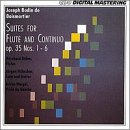| All Artists: Joseph Bodin de Boismortier, Jurgen Hubscher, Bernhard Bohm, Achim Weigel Title: Boismortier: Suites for Flute and Continuo Op 35 Nos 1-6 /Bohm * Hubscher * Weigel Members Wishing: 0 Total Copies: 0 Label: CPO Release Date: 1/25/1995 Genre: Classical Styles: Chamber Music, Historical Periods, Baroque (c.1600-1750) Number of Discs: 1 SwapaCD Credits: 1 UPC: 761203904822 |
Search - Joseph Bodin de Boismortier, Jurgen Hubscher, Bernhard Bohm :: Boismortier: Suites for Flute and Continuo Op 35 Nos 1-6 /Bohm * Hubscher * Weigel
 | Joseph Bodin de Boismortier, Jurgen Hubscher, Bernhard Bohm Boismortier: Suites for Flute and Continuo Op 35 Nos 1-6 /Bohm * Hubscher * Weigel Genre: Classical
|
Larger Image |
CD Details |
CD ReviewsCharming but Some Doubtful Choices Leslie Richford | Selsingen, Lower Saxony | 04/03/2009 (3 out of 5 stars) "Joseph Bodin de Boismortier (1689 - 1765): Six Suites Opus 35 for Flute Solo or with Bass. Performed by Bernhard Böhm (transverse flute and alto recorder); Jürgen Hübscher (lute and baroque guitar); Achim Weigel (viola da gamba). Recorded in October 1988 by the South-West German Radio in Baden-Baden, Germany. Released in 1989 as cpo 999 048-2 (LC 8492). Total playing time: 64'38".
Boismortier, although considered in his time to have written too much, was in fact one of the forerunners of the influence of Italianate style on French music, and his flute music in particular is always well worth a listen. He wrote his Opus 35 "pour une flute traversière seule" with or without bass in 1731, and this too is music that can charm and delight. But a listening to this CD soon made me feel that its charm and delight were obvious when played on the instrument it was written for, but much less so when played on an alto recorder, as Bernhard Böhm has here done with three of the pieces. In order to be fair, I should perhaps quote verbatim his justification of this decision: "As can be gathered from most French didactic works, the transposition of the transverse flute part for the recorder was a matter of course. The transposition was usually a minor third higher because of the limited low ranger of the recorder. Since the alternation of flute instruments also appeals to the ear, we have assigned three suites to each flute type." - I simply disagree; the recorder pieces, both solo and with bass, do not and cannot match up to the sound of the transverse flute for this music; they sound decidedly weak and colourless (in my humble opinion). In addition to this quibble, I am not sure the instruments chosen were ideal either: a copy of an alto recorder by Stanesby and a copy of a Rottenburgh flute - would it not have been more logical to choose instruments of French provenience? The use of baroque guitar and lute as bass instruments instead of the harpsichord was another decision made here, but this time it seems perfectly natural and sounds lovely. The third instrument is a viola da gamba. The engineering is okay, but I have heard better from cpo. All in all, this is an interesting recording with some rather obvious weaknesses (from my point of view)." |

 Track Listings (31) - Disc #1
Track Listings (31) - Disc #1